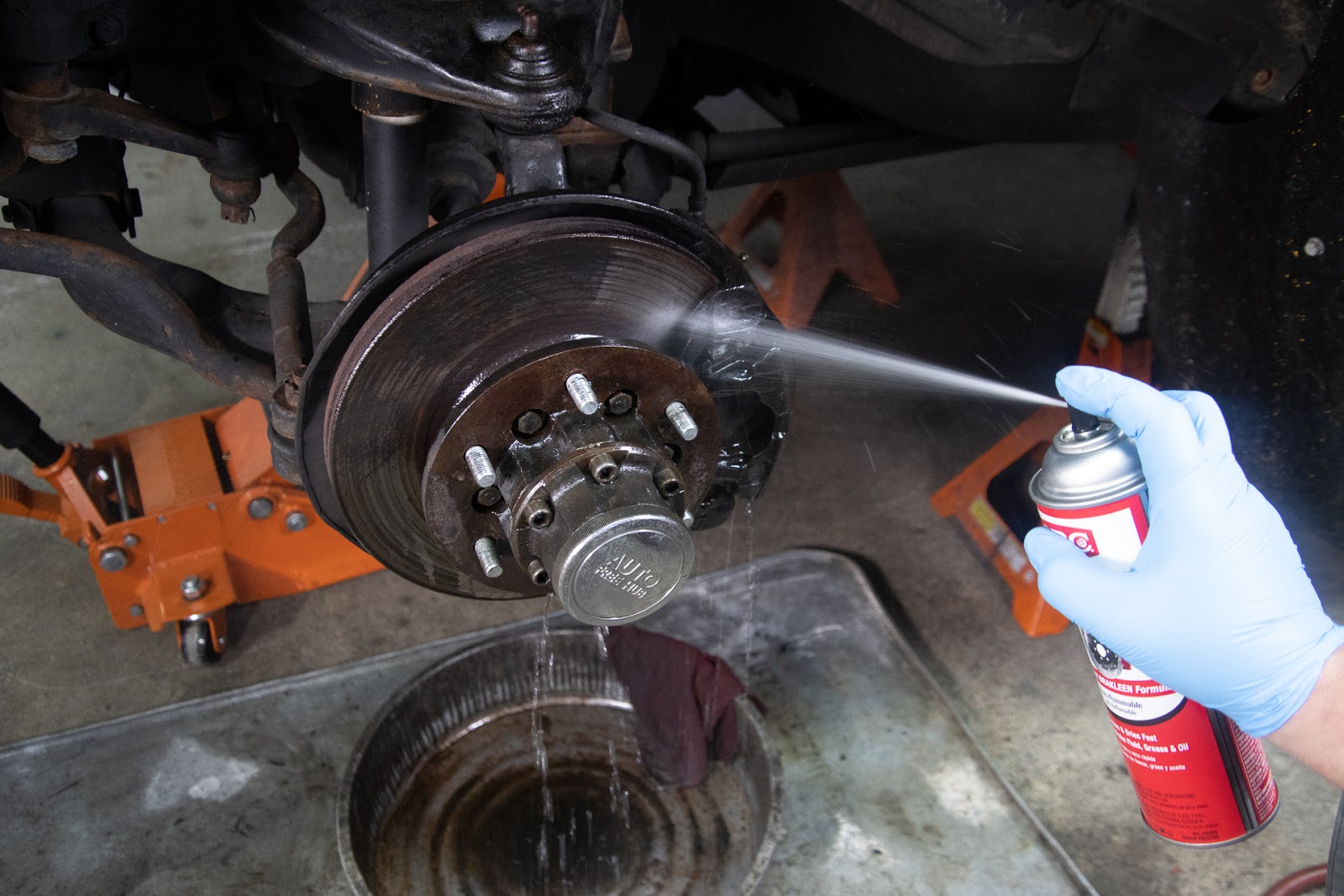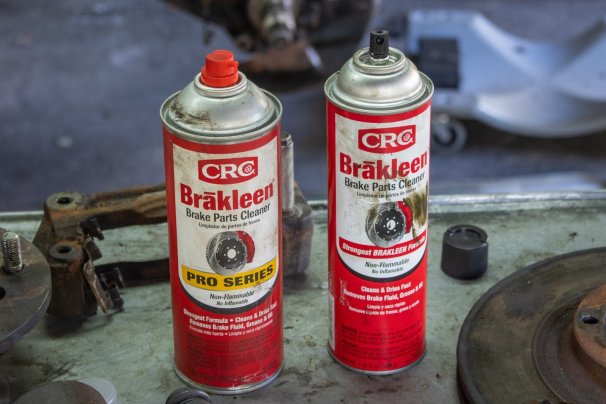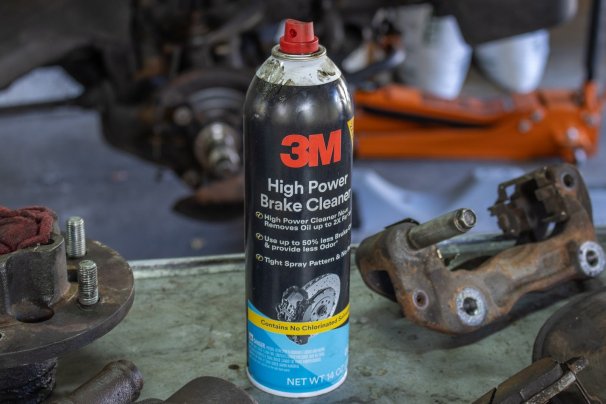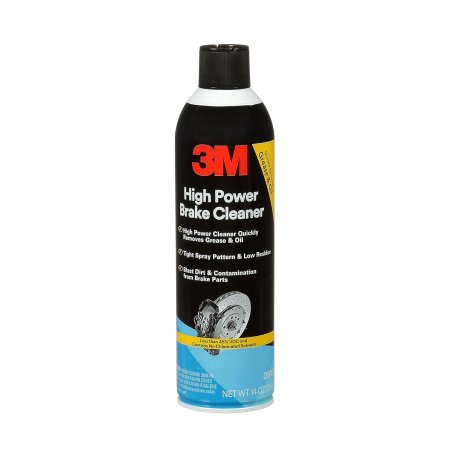We may earn revenue from the products available on this page and participate in affiliate programs. Learn more ›

From start to finish, brake cleaner is an indispensable brake job tool. Well, it has plenty of applications and can be used any time you’re trying to remove grime from underneath your car. The laser-focused high-pressure stream of powerful cleaners blasts away grease and dirt, and liquifies harmful brake dust in seconds. Once the crusty old brake parts are off the axle and in the bin, this quick-dry cleaner removes protective oils from new disc rotors and other brake parts for a super clean installation. Just keep it away from your car’s paint.
Choosing the right brake cleaner can be vexing at best, so we grabbed a few armloads of cans and put them to work on a front disc brake overhaul to find out which one is the best.
Summary List of Brake Cleaners
- CRC Brakleen Non-Flammable
- Johnsen’s OTC Compliant Non-Chlorinated Brake Cleaner
- 3M High Power Brake Cleaner
- Berryman 2420 Non-Chlorinated Brake Parts Cleaner
- Lucas Oil Brake Parts Cleaner
Our Methodology
We chose the best brake cleaners by comparing a host of brand-name formulas. We looked at effectiveness, legality, chemical content, ease-of-use, spray pattern, and drying time, and then compared it with the price it was being offered at. All of these cleaners will do a good job at cutting through grease, but how much is needed, how fast it’ll dry, whether its legal in your state, etc., changes a bit between each. Plus, the more value for your money, the better. For more on how we select products, check this out.
Best Brake Cleaner Reviews & Recommendations
Best Overall
CRC Brakleen Non-Flammable
Pros
- Non-flammable and highly effective
- Almost 100% perchloroethylene
- Does not contain paint-damaging methylene chloride
- Leaves no residue
Cons
- Not available in California or New Jersey
- Can cost more than some non-chlorinated brake cleaners
- Contact with hot surfaces can produce deadly phosgene gas
Best Value
Johnsen's OTC Compliant Non-Chlorinated Brake Cleaner
Pros
- One of the cheapest brake cleaners on the market
- Effective at cutting through caked on muck
- Sold in all 50 states
Cons
- Highly flammable
- Acetone can damage plastics and paint
- Not as effective as CRC’s offering
Honorable Mention
3M High Power Brake Cleaner
Pros
- High performance
- Brilliant shine on bare metal surfaces
- Three different formulations for professionals and DIYers in all markets
Cons
- Premium performance comes at a higher price
- Three different part numbers that share the same name can result in confusion
- Highly flammable
Honorable Mention
Berryman Non-Chlorinated Brake Parts Cleaner
Pros
- Non-chlorinated means it dries fast without potentially harmful gas
- Works well at at cutting through deep dirt and grime
- Good spray pattern
- Leaves no residue
Cons
- Not for sale in California and Utah
- Requires a bit more liquid than some competitors to cut through dirt and grime
Honorable Mention
Lucas Oil Brake Parts Cleaner
Pros
- Good performance
- Excellent spray pattern
- Great spray pressure makes tough-to-reach applications a breeze
Cons
- Like other non-chlorinated formulas, it’s not as effective as its chlorinated counterparts
- Lower can life, though its very low price certainly makes that easier to deal with

Our Verdict
Non-flammable chlorinated formulas like our best overall winner CRC Brakleen Non-Flammable Brake Cleaner are time-proven favorites. Pick it up by the case or the gallon if the law allows; you’ll save a bundle. Newer non-chlorinated blends are improving, but formulations and availability vary. Relatively new 50-state legal formulas blur longstanding distinctions between chlorinated non-flammable and non-chlorinated flammable types.
What are the different types of brake cleaners?
Chlorinated brake cleaners contain powerful solvents like tetrachloroethylene (also known as perchloroethylene or PERC), methylene chloride, and other organochlorines. This top-shelf heavy hitter cleans parts fast, dries quickly, and leaves no residue. Chlorinated brake cleaner is non-flammable, but it should only be used to clean cool parts; tetrachloroethylene can create deadly phosgene gas if it contacts surfaces above 315 degrees Fahrenheit.
Non-chlorinated, flammable brake cleaner is less potent but no less toxic than its chlorinated cousin and can take longer to dry. Non-chlorinated brake cleaners use a blend of hydrocarbon solvents and alcohol to get the job done. These blends can contain hexane, acetone, toluene, naphtha, benzene, xylene, and methanol. Most non-chlorinated brake cleaner ingredients are extremely flammable. Use caution.
How much do brake cleaners cost?
Under $5: Many brake cleaners fall into this category, and you usually get what you pay for. It might seem counterintuitive to spend $4.95 for the same quantity as the $2.95 can, but more powerful formulas can get the job done with less.
$5-8: Stepping up with a few more bucks gets you a more effective product and more of it. Mid-range and premium brake cleaners often pack a powerful cleaning punch, a few more ounces in the can, and high-volume spray nozzles for on-target success.
Over $8: Brake cleaner prices vary wildly online. A single can that costs a few bucks at the local auto parts or big box store can list for crazy money online. Buying in bulk or by the case is an economical choice when ordering on the Internet.
Brake Cleaner FAQs
You’ve got questions. The Drive has answers.
Q: What are some important things to keep in mind when buying brake cleaner?
A. Rules and regulations: Brake cleaner formulations are changing to meet state and federal requirements. Conventional wisdom may not apply to newer formulas, so read the label and check out the Material Safety Data Sheet to make sure what you’re using.
Deadly and deadlier: Choosing between chlorinated and non-chlorinated brake cleaner is like choosing whether to fight a lion or a tiger. Both will kill you, most likely in different ways. Wear safety gear and live to wrench another day.
Guns and parts: Folks swear by brake cleaner to clean all sorts of parts and even guns, but that doesn’t mean you won’t swear at it. Chlorinated brake cleaner ingredients might be OK for other parts and guns, but non-chlorinated brake cleaner solvents can damage paint, plastics, and non-brake parts.
Volume Pricing: Check the listed volume before purchase and determine the per-ounce price before purchasing. A $5 can of high-quality chlorinated brake cleaner is often a better deal than a $2 can of less-effective, non-chlorinated brake cleaner.
Q: Does brake cleaner harm brake pads and shoe linings?
A. No, not at all. Brake cleaner is a safe and effective brake pad and shoe lining cleaner. A few quick squirts of brake cleaner removes grease and accumulated crud that can damage brake pads and rotors. Brake cleaner also removes accidental grease and oil from new brake pads and shoes during installation.
Q: Will brake cleaner damage the paint?
A. Yes. Some brake cleaners contain acetone, methylene chloride, and other solvents that damage paint. Acetone can damage some plastics. Chlorinated brake cleaner without methylene chloride might be OK, but it’s far better and less expensive to play it safe. Protect all painted and plastic surfaces from brake cleaner overspray.
Q: Can I use brake cleaner to remove brake dust from my wheels?
A: Don’t do it. Most automotive wheels wear paint or a protective clear coat over the aluminum alloy. Chlorinated brake cleaners can contain paint-melting methylene chloride. Non-chlorinated brake cleaners are full of aggressive solvents and acetone that damage paint and plastics. Use hand dishwashing soap or wheel cleaner to clean your wheels.
Q: Can I use brake cleaner on electrical parts and connectors?
A. No. Acetone and other brake cleaner chemicals can damage plastic connectors, wire insulation, internal electronic components, and even lift conductor traces off printed circuit boards. Only use a dedicated electronic parts or electrical contact cleaner on all electrical parts and connectors.
Q: Can I use WD40 as a brake cleaner?
A. No. Not now, not ever. For the thousandth time, no. Never spray WD40, lubricant, or lubricating cleaner on your brakes. Oils and greases of any kind will permanently damage your brake pads and rotors and result in a dangerous reduction in brake performance. Do not use WD40 on brakes.








